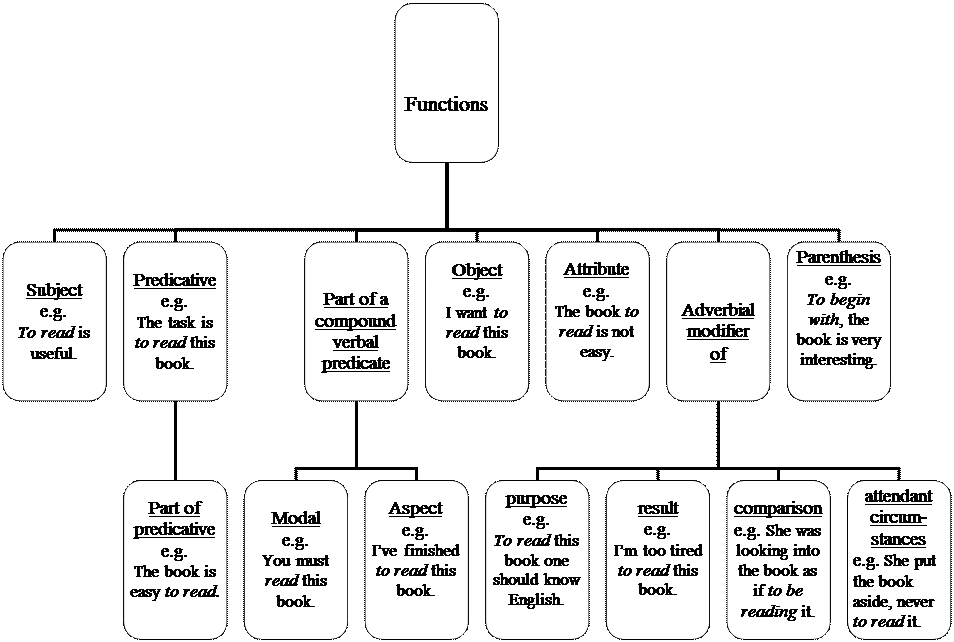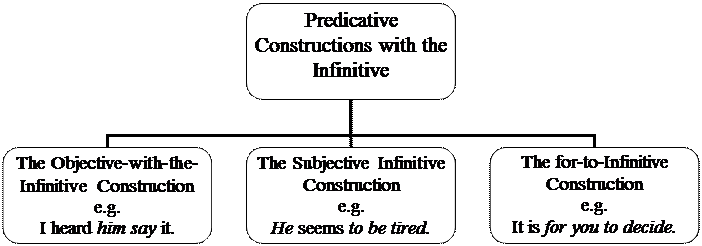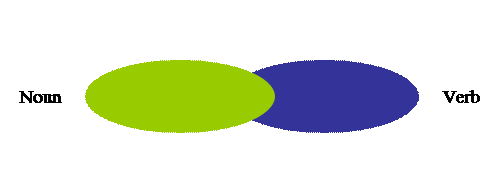| Nominal character | Verbal character |
| 1. It can be used as a subject of a sentence e.g. To see is to believe. | 1. It can take a direct object (transitive verbs) e.g. He wants to see me. |
| 2. It can be used as an object e.g. He wants to see me. | 2. It can be modified by an adverb e.g. I want to see him immediately. |
| 3. It can be used as a predicative e.g. To see is to believe. | 3. It has tense, aspect distinctions, voice distinctions(transitive verbs). |
The infinitive performs the functions of all types of notional sentence-parts, i. e. the subject, the object, the predicative, the attribute, the adverbial modifier (Fig. 69). In all syntactical functions the infinitive may be used alone, without any words depending on it, as the headword of an infinitive phrase, with one or more words depending on it, as part of an infinitive predicative construction, as a logical predicate to some nominal element denoting the logical subject of the infinitive.
The infinitive is used in predicative constructions of three types: the objective with the infinitive construction, the subjective infinitive construction and the so-called for-to-infinitive construction (Fig. 70).
In the objective with the infinitive construction the infinitive (usually an infinitive phrase) is in predicate relation to a noun in the common case or a pronoun in the objective case. The whole construction forms a complex object of some verbs. It is rendered in Russian by an object clause.
In the for-to-infinitive construction the infinitive (usually an infinitive phrase) is in predicate relation to a noun in the common case or a pronoun in the objective case introduced by the preposition for. The construction is used where the doer of the action (or the bearer of the state), expressed by the infinitive, is different from that of the finite verb (the predicate).
In the subjective infinitive construction the infinitive (usually an infinitive phrase) is in predicate relation to a noun in the common case or a pronoun in the nominative case.
Fig. 69


Fig. 70
The Gerund
The gerund is a non-finite form of the verb with some noun features (Fig. 71). The gerund serves as the verbal name of a process.

Fig. 71
The general combinability of the gerund is dual (Table 9). Morphologically the verbal character of the gerund is manifested in the categories of voice and perfect. The verb-type combinability of the gerund is displayed in its combining with with nouns expressing the object of the action; second, with modifying adverbs; third, with certain semi-functional predicator verbs, but other than modal.
The nominal character of the gerund reveals itself syntactically, mainly in its syntactical function, partly in its combinability. Like a noun, it can function as subject, object, or predicative. When it is an attribute or an adverbial modifier, a gerund, like a noun is preceded by a preposition. The fact that the gerund can associate with a preposition is a sure sign of noun features. Like a noun, but unlike the other non-finites, it can combine with a possessive pronoun and a noun in the genitive case denoting the doer of the action expressed by the gerund.
Table 9






